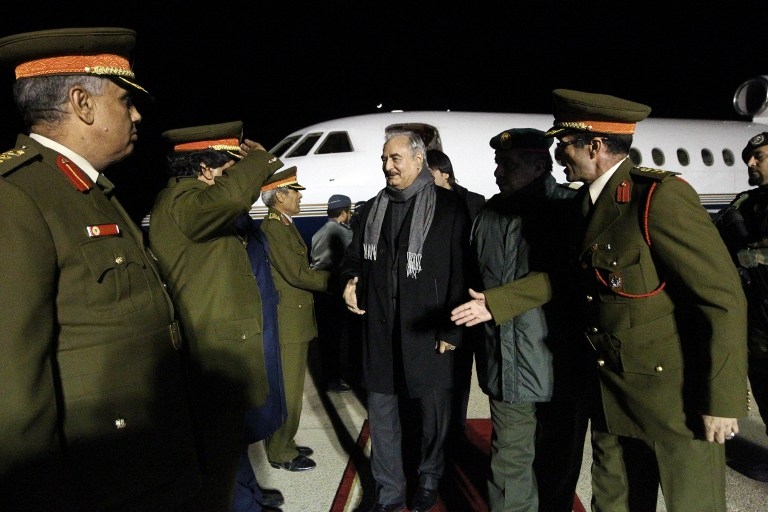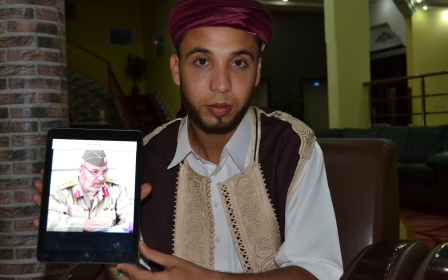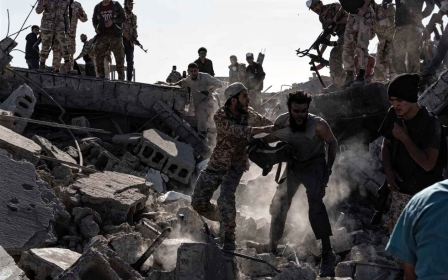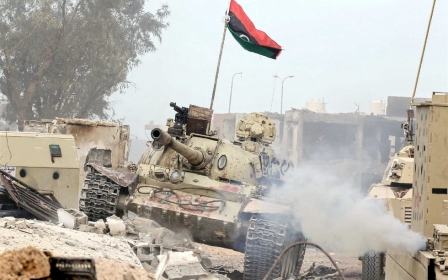Peace in Libya? One man Donald Trump can't ignore

The Trump administration and the promise of a new set of geopolitical alliances are on the horizon and even Libya is feeling the winds of change.
After years on the periphery of the post-Gaddafi peace processes, Field Marshal Khalifa Haftar and his forces seem to be leveraging their September takeover of Libya's Oil Crescent and recent territorial expansion converting them into military momentum on the ground and increased support internationally.
Many speculate that the incoming US administration will look more favourably at anti-Islamist strongmen like Haftar and Egypt's President Abdel Fattah al-Sisi, freeing them up from previous international norms which hamstring their attempts to crush their enemies.
Tensions in Tripoli
On 14 December, Haftar's Libyan National Army (LNA) announced its intention to "liberate" Tripoli from what they dub militia and "Islamist" control. Two days later, it mobilised reinforcements at the Watiya airbase south of Zawiyya, the main oil port in western Libya.
Tensions have been simmering in Tripoli for weeks between militias that support the UN-backed Government of National Accord (GNA) and those seeking to overthrow it. In early December, clashes broke out across the capital, although a ceasefire was quickly put in place.
These inter-militia rivalries have only been heightened since the Misratan-dominated Bunyan Marsus forces declared victory against Islamic State in Sirte on 5 December, with the mobilisation of some Misratan factions to support the anti-GNA forces in Tripoli.
The situation is now reaching boiling point as the city suffers chronic shortages of liquidity, power and water, and the impotence of the GNA becomes ever more evident.
It may seem that Tripoli is ripe for the picking, given that Haftar's enemies in western Libya are locked into their own inter-militia fighting.
Yet, this is to misunderstand the deep anti-Haftar sentiment that would quickly unite western Libya were he to make a brash move. Haftar is unlikely to move on Tripoli or the western oil ports. His allies there are too weak, and the repercussions of the conflict would be too severe.
However, he can use the announced move on Tripoli to signal his growing power, both to his rivals on the ground and to potential allies regionally and internationally. It could also create the necessary political leverage for him to be included in larger negotiations about Libya's future, from which he has been previously excluded.
Growing international support
From an international perspective, Haftar's strategy seems to be working. Russia increasingly views the general as "its man" in Libya.
Similarly to Syrian President Bashar al-Assad or Sisi, Haftar espouses anti-terrorist rhetoric and is willing to use force to achieve his aims. As a former member of the Gaddafi regime, Haftar also fits into the counter-revolutionary regional power bloc represented by the leaders of Syria and Egypt.
In recent weeks, Haftar and his political allies have made several trips to Moscow to negotiate deals for Russian arms. Egypt, likewise, has been steadfast in its support for Haftar.
Although, like Moscow, Cairo officially supports the UN's Libya Political Agreement (LPA), it has recently hosted an alternative negotiation process with the aim of finding a way to include Haftar within the current LPA by renegotiating the agreement or providing an alternative to sidestep that process entirely.
The UN and most Western countries maintain that the LPA is the only solution to Libya's crisis. However, the UN envoy to Libya has also said that its terms are not "set in stone," indicating that Haftar will likely be granted some power under any renegotiated deal.
Indeed, it is hard to see how this can be avoided given the significant leverage Haftar now holds as a result of his territorial and strategic gains.
Haftar’s leverage on the ground
Three months ago, Haftar's LNA forces occupied the oil ports with barely a shot fired. Then, in early December, after successfully routing a counter-attack, the LNA extended its territorial control further to the southwest.
In eastern Libya, Haftar's popularity has grown as military governance structures provide a semblance of stability. The LNA is also making slow but steady gains against jihadi fighters.
Of course, Haftar has many opponents, mostly in western Libya but also in the east. However, Haftar is managing to represent himself as a credible alternative to the current political order, and his stock is rising especially given the growing dissatisfaction with the GNA, inter-militia warfare and the collapse of the Libyan dinar.
In the oil ports of Libya's east, Haftar negotiated mutually beneficial deals with the local tribes that ultimately allowed his force to seize and reopen the ports from Ibrahim Jadhran's Federalist supporters.
By allowing the oil to flow and providing stable security at the ports, Haftar has significantly increased his political leverage and standing among Libyans, as well as the international community, strengthening his negotiating position for any fresh political bargaining.
Zintan-Misrata alliance in western Libya?
Although anti-Haftar sentiment runs much deeper in western Libya, Haftar appears to be applying similar tactics there to advance his influence.
Although Haftar's rivals know that his forces are militarily weak in the west, they no doubt realise that he is almost certain to have a key role under any new political agreement.
On 14 December, the Zintanti Petroleum Facilities Guard (PFG) unit based in al-Rayayna in the Nafusa mountains lifted its two-year blockade on the pipeline running from southern oil fields to the Zawiyya refinery. This is expected to allow up to 400,000 barrels per day of crude to flow, which would significantly boost Libya's oil exports and revenues.
The National Oil Corporation had been pushing for this blockade to be lifted since Haftar reopened the oil crescent. It's significant that this happened at the same time as LNA fighters were spotted moving south of Zawiyya.
As a result of Haftar's inevitable role in future political agreements, it seems that through informal channels of contact between Haftar's loose allies in Zintan and factions from Misrata and Tripoli a pipeline deal has been negotiated which seeks to benefit all these parties under any new peace process.
It is not clear what the terms of this deal might be, or how fragile its existence. However, it is likely that Zintan and Haftar have agreed to reopen the pipeline and not provoke conflict in the region in exchange for granting them key positions under any new political agreement.
Conflict in or around Tripoli does not benefit any of these factions. Misrata has already suffered heavy losses during the fighting against the Islamic State group in Sirte, while conflict within Tripoli will only worsen the economic and infrastructure woes of the capital.
The LNA is still bogged down fighting jihadi groups in Benghazi and Derna, who would be central to any LNA victory in western Libya, and it does not seem to have an appetite for any more conflict.
Given all the above, the mobilisation of LNA troops south of Zawiyya may be interpreted not so much as an overtly offensive move but rather as a defensive reminder that Zintan is only allowing the oil to flow on condition that the Zintanis benefit in Libya's new political landscape.
There are too many different factors at play in Libya to know whether this apparent rapprochement between Zintan and Misrata will last. Conflict in western Libya does not seem to be in anyone’s interest, but that does not mean it can be ruled out.
What does seem more certain, however, is that Haftar's growing domestic and international power means that he and his allies must be brought inside the international political process on Libya. It might be that Donald Trump, with his flexible approach to diplomacy and his desire for a pragmatic defence of American interest abroad, may be just the person to do this.
- Rhiannon Smith is Deputy Director at EyeOnISISinLibya.com and Managing Director of Libya-Analysis
- Jason Pack is the founder of EyeOnISISinLibya.com, president of Libya-Analysis, and the Senior Aanalyst at CRCM North Africa
The views expressed in this article belong to the author and do not necessarily reflect the editorial policy of Middle East Eye.
Photo: General Khalifa Haftar (C), commander of the armed forces loyal to the internationally recognised Libyan government, is greeted upon his arrival at Al-Kharouba airport south of the town of al-Marj, about 80 km east of the Mediterranean port city of Benghazi on 3 December 2016 after a visit to Russia (AFP)
New MEE newsletter: Jerusalem Dispatch
Sign up to get the latest insights and analysis on Israel-Palestine, alongside Turkey Unpacked and other MEE newsletters
Middle East Eye delivers independent and unrivalled coverage and analysis of the Middle East, North Africa and beyond. To learn more about republishing this content and the associated fees, please fill out this form. More about MEE can be found here.





